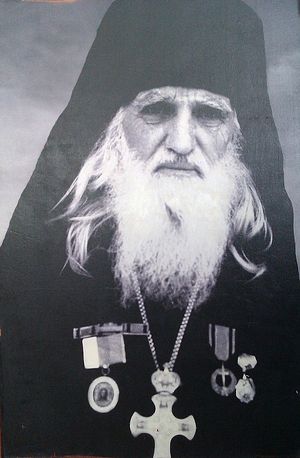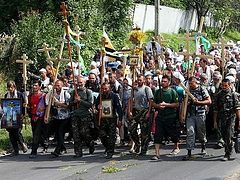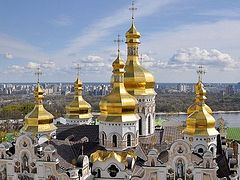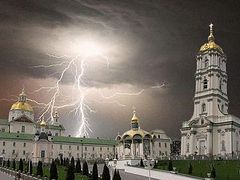This story took place in the late 1990s.
We had been on friendly terms with Archpriest Oleg Teor[1], rector of the Church of the Holy Right-Believing Prince Alexander Nevsky in the city of Pskov, for many years, and we were not surprised when Fr. Oleg asked us to collect clothes for poor residents of the Pskov region for winter season. He always gave a cordial welcome to pilgrims in his church, organized pilgrimage trips to the Pskov region’s holy places, was kind, amiable, and wholly devoted to God—so we always felt drawn to him.
This time also we set about carrying out Fr. Oleg’s blessing without delay by organizing a collection of clothes at the Church of the All-Merciful Savior of the former Convent of the “Joy of All Who Sorrow” icon of the Theotokos in central Moscow. The work went on smoothly. People donated clothes of good quality and by the beginning of December we had collected about forty bags of clothes, shoes, toys and other things donated by the church parishioners and generous Muscovites.
The Muscovites understood our concern and came in great numbers. Our church was uniquely very poor, which is a rarity in the center of the capital. Its walls were worn away by time, foul weather, and misuse by the former occupants. Simple paper icons, pasted on cardboard and inserted into home-made frames, hung on those walls. There were wooden candlestick holders with sand in them inside the cold church, cracks in the floor through which one could see last year’s grass, and many other things indicating the building’s financial difficulties.
But the church lived on because people came to it, not the least those with many problems, as was usually the case back in the nineties. Many young people came there with their friends and acquaintances. We lived as one large family, and everybody was invited to tea after each service. With a failing heart I thought about how the girls would travel back home alone to the outskirts and suburbs of Moscow after evening services in those troubled times. But the Church prayed, and there were no incidents at all.
Miracles kept occurring with people who made up the heart of our community: sick parishioners recovered, family and domestic problems were sorted out, and all of us witnessed that the Lord is the Living God and His promises are unalterable.
So, early in December, at the weekend my acquaintance and I were to leave for Pskov with the humanitarian aid. However, we learned that the Pskov parish truck which ran between Pskov and Moscow was not available at that moment, and Fr. Oleg blessed us to solve this problem without outside help, which we did.
One of our parishioners had an old “Gazelle” van. He loaded the bags into his car and transported them to the railway station; we placed them in the train’s baggage car and ourselves travelled in a sleeper with reserved berths.
In the evening we at last had time for rest after a busy day. A night journey to Pskov was ahead of us. My companion had a quick snack and climbed the upper berth to rest. I remained on the lower berth to finish my tea and plan things for the next day. We were aware that nobody was going to meet us in Pskov, so we had to get to the church on our own.
“Would you like to try some of my jam?” we heard the voice of our fellow traveler who was sitting in front of me. He was older than both of us. His grey, bright eyes were looking at me with a smile. Smiling at him in return, I reached out for the jar of jam, the fragrance of which I smelled from a distance.
“This is Crimean rose petal jam. We gather these roses in the eastern Crimean valley and make jam for the winter ahead.”
“You don’t look like a native of the Crimea,” I entered into the conversation. “I’d say you come from either Belarus or Lithuania. At least, it looks like your roots are there.”
Not only his appearance, but also his slight accent suggested that my first conclusions about my fellow traveler were true.
“That’s not quite true,” he said. “I come from Transcarpathia—Carpatho-Russia, to be more precise. I have lived in Russia for a long time, though I’ve had to travel the length and breadth of the USSR. Now I am going to my wife’s relatives, to give something to them and take some things from them. And what is your destination, if it’s not a secret?”
I told him briefly about Fr. Oleg’s blessing, after which our fellow traveler began to gaze at us with a great interest.
“It’s good that you are a religious person. Formerly religious company was a rarity. Now the situation has changed. On the one hand, there are more baptized people than before; on the other hand, today not everyone has a strong faith. Though this is what really matters.”
“And what can you say about faith in your native land?” I asked, trying to keep the ball of the conversation rolling. “I read that Carpatho-Russia has always been known for the great piety of its people.”
“Even in the darkest of times—under Austrians, Czechs, Hungarians and in the Soviet era—our people never betrayed their faith. Everybody was baptized and went to church more or less regularly. People prayed at home without fail. Although they lived in poverty, they didn’t walk away from their faith. On Church festivals our family would come to Ugolka, to Fr. Job[2], who was venerated as a confessor of the faith. Under Stalin he languished in labor camps and was within a hair's breadth of death. He would speak little about this period of his life. But he would say that it was there, in the labor camps of Vorkuta, that he came to realize that Russian people are our brothers.
“Believers from Russia would flock to Fr. Job, and he became the spiritual father to many of them. Why did they come to him? In those years the Church was controlled by the Soviet authorities, and any form of pastoral guidance was prohibited. Our situation was better than yours as the control was not so tight. Thus the faithful travelled from major Soviet cities to border regions to ‘take a breath of the fresh air of Orthodoxy’.
“It was Fr. Job who blessed me to remain in Russia after the army. I think he understood that the trouble with many Ukrainians (and our region joined Ukraine in 1939) is that they know very little of Russia, and they are drawn to the West—which doesn’t care about them. They live in villages, small towns and have no idea of the vast expanses of Russia, its historical and spiritual missions.”
“So you remained in Russia?”
“Not only did I remain in Russia, I also with the blessing of Fr. Job married a Russian woman and have lived in Russia ever since. In recent years I have visited my native land very seldom. Living in Russia has broadened my horizons. I came to realize that Fr. Job was right when he said that we [Carpatho-Russia] cannot exist without Russia. Without Russia we will have no freedom, no prosperity, no specific cultural or spiritual identity. The West will ‘eat us, chew us up and spite us out’, and our brother will remain ‘as poor as a church mouse’, as the saying goes.
“Almost all residents of Carpatho-Russia are conscious of this, but not the majority of Ukrainians. Here is the problem: If we were closer to Russia, we would unite with it and live together according to the will of God. But our contacts are still through Ukraine, and Ukraine is very different—it is infected with nationalism and envy towards Russians in no small way.”
“And how can the Ukrainian people get over this illness?” I asked. I didn’t want to end the conversation, although it was late.
“Only the Lord can overcome this illness, as you call it,” my companion continued. “Time and serious trials are needed here; the Ukrainian nation won’t come to its senses until then. And I don’t think this will apply to all Ukrainians: some will emigrate to the West, others will ‘keep a low profile’; but the majority need to be “shaken up’ in order to change. This is what happened with the German nation when it felt it on its own back, this is what Nazism and war mean. A boil has to burst, and there will be no result until there is no longer any pus. Otherwise the abscess will suppurate on and on with all the attendant consequences.”
“But why should the Lord care for Ukraine, which makes its own choice?” I wondered, formulating my question incorrectly.
“The elders say that time is speeding up, and the history of our world may be coming to a close. Everything is heading towards the end. After the coming of the antichrist only a little flock will be saved; and I believe that the oasis of salvation will be in Holy Rus’—that is, in Russia and the neighboring countries that will be of the same spirit with it. So the world is now being divided into those who are with Russia and those who are against Russia. And the Ukrainian people will have to decide too. Though the circumstances will be extremely difficult—the enemy of mankind will exert pressure on them through false friends in Europe and America. We will become witnesses of all of this, perhaps very soon. In my opinion, we cannot consider human history without a proper understanding of God’s plan for us, our world, and our country.”
While my fellow traveler was speaking, I was thinking about the epoch we lived in. The beginning of the third millennium was at hand. Russia was very weak, beset by economic and political instability, poverty, and was on the verge of the breakup. The Church alone was steadily developing and reviving both outwardly and inwardly. The West was inclined to adopt the immoral programs which would have ruinous results for its people. In Ukraine nationalism was gathering momentum. China was rising, expanding its cultural and (partly) spiritual horizons through its economy. Other countries were making choices as well. But what was in store for us, for Russia? I asked my fellow traveler about this.
“In the Soviet era, spiritual elders said that the world would change soon. There would be freedom with its advantages and disadvantages. The Church would be revived and our country would be gradually restored and would no longer be called the Soviet Union. Though we would never be rich (wealth won’t do us any good), we would be strong. As the Church would grow, the Lord would send Russia strong leaders who believe in God and would be able to grasp the essence of true development. But life would be difficult in all times. The loss of faith in God and morality in the West would result in the coming of the antichrist, who will try to come to Russia as well. But after three and a half years of great tribulation there will be the end of his rule and the Second Coming of Christ.”
My fellow traveler and I talked through the night. He alighted at a station before Pskov (I think it was Staraya Russa), whereas I remained on the train, thinking of the meaning of that conversation for me. I was lying there, unable to fall asleep, with just one thought in my mind: “What will become of us in twenty years?”
***
About twenty years has passed, and many things that my fellow traveler prognosticated have come true. We have seen these events in Russia, Ukraine, and the West. The East has seen many dramatic changes too: every year one or two Orthodox churches are opened in Southeast Asian countries, so the Russian Church will soon consider establishing a new diocese in the region[3]. Chinese tourists are displaying a growing interest in Orthodox shrines. The Holy Trinity-St. Sergius Lavra receives several coaches with Chinese “pilgrims” every day. Chinese guests stand at Orthodox services, buy something at church shops, take photos, and discuss things.
Yet the main problem is the “speeding up of time”. Judging by the current events and processes, the world is heading for the abyss. Not many will be able to jump over the abyss and land on its other side. However, all of us will have to make that step, if we don’t want to perish with the things that should perish. Are we prepared for this? Will we be faithful to Christ to the end?






